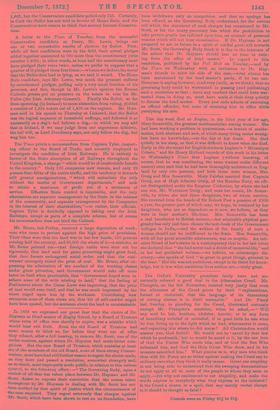The Oxford University preachers lately have not un- naturally referred
a good deal to the Athanasian Creed. Mr. Plumptre, on the 3rd November, insisted very justly that even the advocates of the Creed prove by their "explanations, formal or rhetorical, that the language of its damnatory or cursing clauses is in itself untenable." And Dr. Posey last Sunday, in pleading for the Creed, illustrated curiously enough Mr. Plumptre's assertion, when he asked,—" Will any soul be lost, heathen, idolater, heretic, or in any form of hereditary unbelief or misbelief, if in good faith he was what he was, living up to the light which he had, wheresoever it came, and repenting him where he did amiss ? All Christendom would answer you, God forbid! He would not be saved by that law which he professeth,' but he would be saved in it, by the one love of God the Father Who made him, and of God the Son Who redeemed him, and God the Holy Ghost Who drew, and in his measure sanctified him." What puzzles us is, why men who think thus with Dr. Pusey are so bitter against making the Creed say to ordinary ears what they think it really means. Grant our stupidity in not being able to understand that the sweeping denunciations do not apply at all to most of the people to whom they seem to apply,—yet why not condescend to our stupidity, and make the words express to everybody what they express to the initiated? Is the Creed a charm or a spell, that any merely verbal change in it should be thought so fatal?


































 Previous page
Previous page